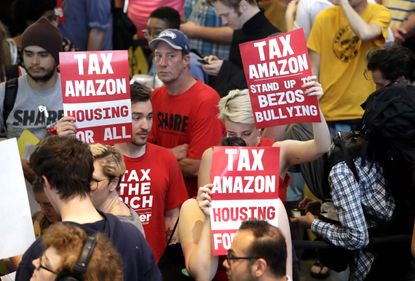Seattle's 'Amazon tax'
The Seattle City Council approved a new $275-per-employee tax on big companies in the city to raise money for homeless services

The smartest insight and analysis, from all perspectives, rounded up from around the web:
"What responsibility do companies have toward the communities in which they function?" asked Aseem Prakash and Nives Dolsak at The Hill. To the Seattle City Council, the answer is quite a lot. Last week, the nine-person panel unanimously approved a new $275-per-employee tax on big companies in the city, in order to raise about $48 million annually for homeless services. Seattle is in the midst of a homelessness crisis: Between 2015 and 2017, the number of people sleeping on the street grew by 44 percent, and some 400 homeless encampments now dot the city. But Seattle's biggest companies, including Starbucks, Expedia, and Alaska Airlines have loudly complained that a tax on them is the wrong approach; Amazon — the city's largest employer — even briefly froze construction on a new, 17-story tower in protest. The threat was clear: "You tax, we leave." Residents are divided over what's become known as the "Amazon tax," said Nick Wingfield at The New York Times. On the one hand, the e-commerce giant has brought tens of thousands of highly paid jobs to the city. But home prices are rising faster than anywhere else in the country — the median home price is now $777,000 — forcing many longtime residents out of the area or "onto the streets."
This job-killing tax is not the solution to Seattle's woes, said The Seattle Times in an editorial. The roughly 600 companies affected provide 150,000 jobs and are "responsible for much of the city's economic activity." They shouldn't be penalized for the city's "bumbling response to the homeless crisis." Last year, nearly $200 million was spent on the county's roughly 12,000 homeless people. Where did all that money go? Residents deserve to "see progress, not just massive spending increases every year." Seattle's City Council has "laudable aims," said Travis Brown at Fortune, but "it's hard to imagine a more destructive strategy for realizing them." Why would any company choose to expand operations in the city now? Plenty of American cities urgently need to tackle inequality and affordability issues. "But economic self-immolation is not the way to do it."
Subscribe to The Week
Escape your echo chamber. Get the facts behind the news, plus analysis from multiple perspectives.

Sign up for The Week's Free Newsletters
From our morning news briefing to a weekly Good News Newsletter, get the best of The Week delivered directly to your inbox.
From our morning news briefing to a weekly Good News Newsletter, get the best of The Week delivered directly to your inbox.
What exactly are cities meant to do then? asked Jared Bernstein at The Washington Post. In Seattle's case, Washington state law prohibits local governments from imposing income taxes and caps real-estate tax increases, so city leaders have to get creative. It's also rich for Amazon, which is demanding huge tax concessions from cities vying for its second headquarters, to protest paying a roughly $10 million–per-year tab. The company's first-quarter income was $1.6 billion. "With a 'b.'" The truth is, when companies put down roots and grow, they create "greater demand for public services," such as schools, police, and infrastructure. "So, yes, I think there's a solid rationale for asking them to offset some of the social costs to which they contribute." This bitter brawl "foreshadows battles to come in other cities," said Elizabeth Weise at USA Today. From San Francisco to Washington, D.C., "public anger has risen over who should pay for the civic woes" that often attend economic growth. In Seattle, the lesson appears to be that leaders can push companies only so far before businesses "push back — hard."
Create an account with the same email registered to your subscription to unlock access.
Sign up for Today's Best Articles in your inbox
A free daily email with the biggest news stories of the day – and the best features from TheWeek.com
-
 'Make legal immigration a more plausible option'
'Make legal immigration a more plausible option'Instant Opinion Opinion, comment and editorials of the day
By Harold Maass, The Week US Published
-
 LA-to-Las Vegas high-speed rail line breaks ground
LA-to-Las Vegas high-speed rail line breaks groundSpeed Read The railway will be ready as soon as 2028
By Peter Weber, The Week US Published
-
 Israel's military intelligence chief resigns
Israel's military intelligence chief resignsSpeed Read Maj. Gen. Aharon Haliva is the first leader to quit for failing to prevent the Hamas attack in October
By Justin Klawans, The Week US Published
-
 The pros and cons of noncompete agreements
The pros and cons of noncompete agreementsThe Explainer The FTC wants to ban companies from binding their employees with noncompete agreements. Who would this benefit, and who would it hurt?
By Peter Weber Published
-
 What experts are saying about the economy's surprise contraction
What experts are saying about the economy's surprise contractionThe Explainer The sharpest opinions on the debate from around the web
By Brendan Morrow Published
-
 The death of cities was greatly exaggerated
The death of cities was greatly exaggeratedThe Explainer Why the pandemic predictions about urban flight were wrong
By David Faris Published
-
 The housing crisis is here
The housing crisis is hereThe Explainer As the pandemic takes its toll, renters face eviction even as buyers are bidding higher
By The Week Staff Published
-
 How to be an ally to marginalized coworkers
How to be an ally to marginalized coworkersThe Explainer Show up for your colleagues by showing that you see them and their struggles
By Tonya Russell Published
-
 What the stock market knows
What the stock market knowsThe Explainer Publicly traded companies are going to wallop small businesses
By Noah Millman Published
-
 Can the government save small businesses?
Can the government save small businesses?The Explainer Many are fighting for a fair share of the coronavirus rescue package
By The Week Staff Published
-
 How the oil crash could turn into a much bigger economic shock
How the oil crash could turn into a much bigger economic shockThe Explainer This could be a huge problem for the entire economy
By Jeff Spross Published